

Is There a Difference Between a Field Trip and an Educational Tour?
There is nothing more exhilarating for most students than hearing the news of an upcoming school trip. It gives students a reason to get out of the classroom, and educators a way to teach and connect with their students on another level. But what kind of trip should you take your students on – a field trip or an educational tour – and is there a difference?
While it might just be an issue of semantics for some people, there is an important difference between field trips and educational tours, particularly those organized by Junior Tours .
Field trips are the typical school trips that most schools plan for their students, lasting anywhere from a few hours to 1-2 days while visiting certain learning sites.
Educational tours are professionally planned tours that have been finely crafted based on the needs of the entire group.
Essentially, an educational tour is an enhanced and upgraded version of the traditional field trip.
While the difference between a field trip and an educational tour may seem unimportant, there are many ways that a professional tour organizer such as Junior Tours can enhance the learning and overall experience of any trip, making it well worth the time and money of every student involved.
Educational Tour VS Field Trip: What’s the Difference?
We’ve all been on field trips, whether as students or educators, and we know the typical expectations that come with school trips. Typical school field trips include:
- The local museum for sciences or arts
- A visiting play or musical performance
- A local university or research center, with an expert or professional
While children always enjoy getting out of the classroom and experiencing something new, it can be difficult to truly engage with the entire group at all times. In many cases, school field trips end up with most students goofing around, not listening to the tour guide, or getting in trouble in unique ways.
And it isn’t always fair to educators to expect them to plan and execute the perfect field trip, as these skills aren’t in their everyday job description. Teaching a classroom of students and implementing a successful field trip are worlds apart.
An educational tour is like a field trip, but handled professionally and every aspect made perfect. With an educational tour planned by professional organizers, schools and teachers can focus on their roles – teaching – while the organizers focus on everything else that children want from a school trip – exciting destinations, interesting guides, awesome activities, effective planning for every step of the trip, and so much more.
Many schools do not realize how much value a professional educational tour organizer can add to a school trip, turning it from just another trip to something that will act as a key part of every school year.
Here are just a few of the places you might visit during an educational tour with Junior Tours:
- Notre Dame Basilica in Montreal
- The Plains of Abraham in Quebec City
- Concerts, performances, and music festivals in North America and Europe
- Rockefeller Center in New York City
- Niagara Falls
- Improv Chicago
- Centennial Olympic Park in Atlanta
- Shakespeare’s Globe Theatre in London
And so many more. Whether for the sciences, business, culture, or the arts, no two educational tours are exactly alike, as each trip is planned with your group’s needs and expectations in mind.
What Can You Expect from an Educational Tour?
How exactly does a Junior Tours educational tour differentiate from a typical school field trip and what can you expect from it? A tour planned by our veteran tour organizers shares the same objectives as typical field trips, but then we do so much more:
Educational tours offer the full experience for students and educators who are looking for something more than just the average community school trip. With our tour, groups can pick their journey based on their subject interest, with popular choices of:
- Music & Band
- Foreign Language
- African American
You can see that the difference between a field trip and an educational tour can be found at the most foundational level: the purpose for the trip, and the direction you build from there. With typical field trips, most schools will pick a local area of interest and try to explain a reason for how students can benefit from visiting it.
With professionally organized educational tours, the organizer and the school will discuss and pinpoint the desired learning experience, and then curate a trip around it to maximize what the students can learn. This means that we focus on enriching a student community with education-focused events, rather than building it the other way around.
How Students and Educators Benefit from Educational Tours Over Field Trips
Students – As a student or parent who might be interested in attending one of our educational tours, you might be looking to see how you or your child will most benefit from this journey. Here’s what you can expect as a student:
Out-of-Classroom Learning: Students will see how to truly learn in context, taking their learning out of the classroom and into the real world. They will see the purpose of what they are learning, and its impact on and how it works in the world.
Social Education Habits: Students will develop social education habits that they can carry with them beyond the classroom and their high school or university lives.
Maximum Engagement: Students will enjoy a trip that is curated to maximize their engagement, excitement, and learning, teaching that learning can be fun 24/7.
Educators and Schools: As an educator or school administrator, you might be interested in the tour but don’t know if our terms are worth the additional planning over a traditional field trip. Here are ways our planning and expertise can help you:
Your Choice of Involvement: A fully planned and organized trip. It is up to the school or educator to decide how much involvement they want with the planning and organizing of the trip; if they would like Junior Tours to handle every part of the itinerary, or if they want to be involved in crafting the perfect tour. We report to you and work on your terms.
As Easy as Possible: We make it as easy as possible to help get all your students and parents on board with the tour – we offer free promotional materials such as posters, flyers, and registration forms; professionally trained tour escorts to help hype up the tour 24 hours a day; complete planning of transportation, food, and first-rate hotel stays; and optional direct billing for your parents to pay directly online. And of course, no hidden costs are involved, with free scratch card fundraiser and scholarship suggestions if necessary.
Absolute Flexibility: We offer absolute flexibility with virtually every aspect of the trip. We only require a minimum group size of 20, while larger groups are gifted cheaper pricing. Trips don’t have to be approved by school boards or affiliated with any school, and travel dates can be picked at any time of the year. Whether this is your first time or tenth time organizing a trip for students, don’t sweat it: we can help you with everything.
The Educational Tour Experience with Junior Tours
Ready to start planning an educational tour to share to your group of students? You can start today – just fill in your information on our request form and we will send you over a free itemized price quote and itinerary within 72 hours. Our required information for now includes:
- Potential destinations
- Type of group
- Mode of transportation
- Number of days
- Approximate travel date
- Estimated group size
- Goals for your trip
- School or group name and address
Based in New Jersey, Junior Tours has been helping schools and student groups tour around the country and the wider world since 1967, and we pride ourselves on our history and tradition as a family-run business with an impeccable reputation. Students and teachers who travel with us are guaranteed to have an amazing time – just read our reviews.
Have a question, need some tips? Contact us through our site or call us at 1-800-631-2241 (for group leaders) or 1-800-237-4797 (for students and parents) and let us know how Junior Tours can help your school or community today!
Company Information
- Request a Tour Quote
Tour Packages
- Montreal & Quebec City
- New Orleans
- New York City
- Philadelphia
- Toronto / Niagara Falls
- Washington D.C.
- Williamsburg
FOR GROUP LEADERS
For students / parents.
Call (800) 237-4797 Email Us (click) My Account Journal
MAILING ADDRESS
© 2024 JUNIOR TOURS. PRIVACY POLICY
- Professional Affiliations
- The Junior Tours Promise
- Request Quote
- Tour Inclusions
- All Destinations
- Booking FAQ
- Toronto & Niagara Falls
- Online Billing
- Letter of Recommendation
- Fundraising / Scholarships
- Rules & Regulations
- Room List Form
- TSA Travel Tips
- About Junior Tours
- Packing List
- Register for a Tour
- Log In to My Account
- REQUEST QUOTE
REQUEST A STUDENT TOUR QUOTE
Please call 1-800-631-2241 and we can provide you all the information to plan an amazing trip for your students. Or spend two minutes completing this form and we’ll email you an itemized price quote and itinerary within 72 hours.
Tour Information
- Colonial Williamsburg
- Montreal / Quebec City
- Type of Group Please select one from drop down Art Band/Choir/Orchestra Business Drama Family Consumer Science FBLA or Deca Group Foreign Language History Honor Society / Beta Club Senior Class Other
- Please describe your group
- Mode of Transportation Please select one from drop down Motorcoach Air Train
- Number of Days Please select one from drop down 2 3 4 5 8 (London only)
- Approximate Travel Date (the week of...) MM slash DD slash YYYY
- Estimated Group Size Note: Lowest tour fares are based on groups of 40+ Please select one from drop down Less than 20 20-29 30-39 40-55 55+
- Briefly describe your goals for the trip
School / Group Information
- School / Group Name *
- Mailing Address * Street Address City Alabama Alaska American Samoa Arizona Arkansas California Colorado Connecticut Delaware District of Columbia Florida Georgia Guam Hawaii Idaho Illinois Indiana Iowa Kansas Kentucky Louisiana Maine Maryland Massachusetts Michigan Minnesota Mississippi Missouri Montana Nebraska Nevada New Hampshire New Jersey New Mexico New York North Carolina North Dakota Northern Mariana Islands Ohio Oklahoma Oregon Pennsylvania Puerto Rico Rhode Island South Carolina South Dakota Tennessee Texas Utah U.S. Virgin Islands Vermont Virginia Washington West Virginia Wisconsin Wyoming Armed Forces Americas Armed Forces Europe Armed Forces Pacific State ZIP Code
- Home Address
- School Address
Personal Information
- Name * First Last
- Title Please select one from drop down H.S. Teacher M.S. Teacher E.S. Teacher Principal/VP/Admin Parent Student Other
- How are you associated with the tour?
- Mobile Phone *
- Primary Email *
- Secondary Email (optional)
Referral Information
- How did your hear about us? Please select one from drop down Google Received a postcard or mailer Referred by a friend or colleague Met at a convention DECA Postcard FBLA handbook Traveled with Junior Tours before. Received an Email from Junior Tours Other
- For your FREE Gift Please specify the Mail Code on back of catalog mailed to you
- Friend or Colleague's Name First Last
- What did you search for?
- What convention?
- Nice! Where did you hear about us?
- Name This field is for validation purposes and should be left unchanged.
Need help logging in?
Not Registered Yet?
- Browse Tours
Educational Travel 101
- Teacher Stories
- ACIS Makes Planning Easy
- Keeping You and Your Students Safe
- Get Rewarded
- Student Stories
- Travel Scholarships & Fundraising
- Keeping Your Children Safe
- Paying For Your Trip
- Download Brochure
What is Educational Travel?
Adventurous, exploratory, informational and fun are some of the ways we describe our educational tours . Done right, educational tours expand travelers’ world view. Not only do students learn, they learn to love to learn. Through cultural exploration and immersion, students become global citizens. They develop a stronger understanding of history, language and geography as well as gain independence, confidence and problem solving skills.
We say it because we believe it: travel changes lives.
Your Educational Tour Team
We are dedicated to ensuring you love travel as much as we do, program consultants.
Program consultants are your pre-departure partner. From tour selection, to group recruitment to easing pre-departure nerves, they are with you every step of the way.
“Jill was absolutely awesome! From the initial planning stages to last-minute changes to our itinerary, she was available and receptive. At every step of the journey, she was tirelessly supportive and encouraging.” — Adam R. Group Leader
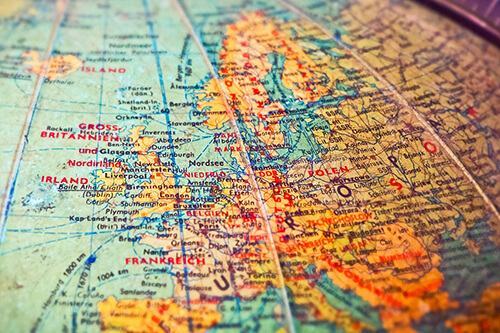
Traveler Support
As the group leader, you’ll know the most about your specific group’s tour and your school’s policies on travel, becoming the first stop for parent and student questions. But for ACIS policies including questions on insurance and payment plans, our traveler support team is eager to help.
“Everyone I talk to is so friendly and helpful!” — Harriet P. Parent
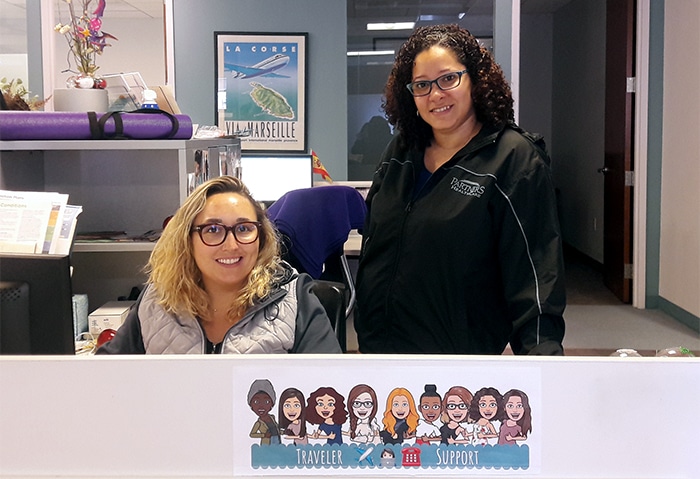
Tour Managers
Part guide, part educator, part engineer, part magician—ACIS Tour Managers lead your group while on tour. They know their destinations, but more importantly they know teachers and students. They keep students engaged, teachers relaxed and the whole group excited to see what will happen next.
“The highlight of our trip was Espin, our tour manager! He is the most AMAZING human being on the planet! He knows everything about everything and is able to communicate with any age group.” — Rose B. Participant

What to Expect on Your Educational Trip
Expect fun, expect adventure, expect to return home with stories you’ll be telling family and friends for years. Our tours are designed by true travel pros who want you to make the most of your time on tour and return home eager to travel again.
Daily Schedule
Each ACIS tour combines just the right mix of planned educational excursions and free time for exploration. Your daily schedule will, of course, vary depending on your location, type of tour and if it is travel-intensive or a more leisurely, single-city program. Typically, you’ll wake up bright and early, and after breakfast, enjoy a morning excursion. You might have a sightseeing tour, cultural connection, entrance to a museum (usually with a reserved entrance so you can avoid the long lines) or walking tour. You’ll have some time for lunch and then enjoy another activity. Dinners will be in town, and then you’ll further explore to see the city sparkle at night.

Cultural Connections
Cultural Connections, included on every ACIS international tour, take cultural understanding to a whole new level. Through immersive activities such as learning the steps of the flamenco or a French cooking class, students look at the culture and history of a place from a different vantage point. It is the ultimate in experiential learning.

ACIS helps you make the most of your time on tour by only using three- and four-star hotels near the heart of what you came to see. We place a priority on booking hotels in convenient and safe areas , with easy access to both local attractions and public transportation. After all, you want to be exploring, not commuting.

Travel rule—never underestimate the importance of food to teenagers! But beyond providing authentic, delicious and satisfying meals, our dinners become a cultural experience because they’re enjoyed in local restaurants. Breakfasts are typically provided at your hotel and lunch is generally available on your own. Your Tour Manager will be sure to point you in the right direction for affordable and delicious eats.

Where would you like to go?
ACIS offers 200+ customizable itineraries to destinations around the world. Let’s work together and change students’ lives.
Educational Tourism: Definitions, Types and Popular Destinations
Educational tourism offers unique opportunities for people to travel and learn by combining the joys of visiting new places with acquiring knowledge. This type of tourism includes various experiences such as study abroad programs, exchange student experiences, and school trips to historical sites or natural wonders. The primary goal is to enrich the learning experience, enhance cultural understanding, and nurture personal development.
As globalization continues to make the world more interconnected, educational tourism has become increasingly popular. People of all ages are eager to broaden their horizons while discovering new environments and cultures. Educational tourists also play a significant role in supporting local economies, fostering cultural exchanges, and contributing to global understanding.
Educational tourism has evolved in response to rising demand and greater availability of diverse travel experiences in recent years. From attending language schools to participating in workshops or seminars, there are endless ways to learn and grow while exploring new destinations. This growth underscores the importance of educational tourism in fostering lifelong learning and bridging cultural divides.
Definitions of Educational Tourism
Defining educational tourism, types of educational tourism, motivations for educational tourism, popular educational tourism destinations, suppliers of educational tourism, educational tourism programs and companies, benefits of educational tourism, challenges of educational tourism, future of educational tourism, what are the examples of edutourism.
Definitions of educational tourists and educational tourism are following as:
An educational tourist (or educational stayover) may be considered as:
a person who is away from their home town or country overnight, where education and learning are either the main reason for their trip or where education and learning are secondary reasons but are perceived as an important way of using leisure time
An excursionist (or same-day educational tourist) is:
a person involved in any educational/learning activity or excursion, which does not include an overnight stay away from their home destination, and for whom education and learning is seen as an important way of using leisure time.
Therefore, educational tourism can be defined as:
tourist activity undertaken by those who are undertaking an overnight vacation and those who are undertaking an excursion for whom education and learning is a primary or secondary part of their trip. This can include general educational tourism and adult study tours, international and domestic university and school students’ travel, including language schools, school excursions and exchange programmes. Educational tourism can be independently or formally organised and can be undertaken in a variety of natural or humanmade settings.
What is Educational Tourism
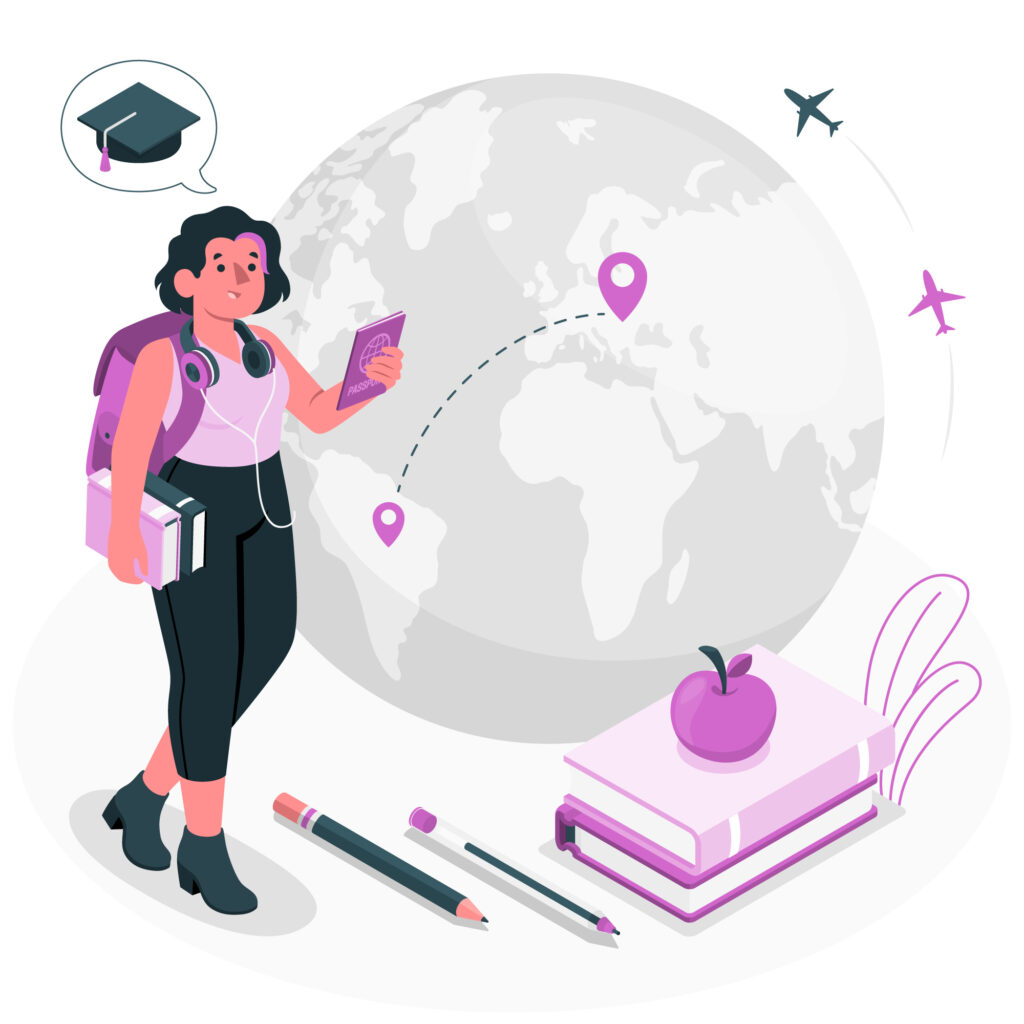
Educational tourism, also known as edu-tourism or educational travel, is a form of tourism whose primary purpose is gaining knowledge and engaging in cultural exchanges. It involves travelling to a different country or region to learn about various subjects such as history , languages, art, and environmental issues.
Education tourism isn’t limited to academic learning; it can encompass any activity or experience that enriches the traveller’s understanding of the world. The goal is to explore new places, foster personal growth, and broaden one’s perspective.
Several types of educational tourism cater to different interests and age groups. Some of the most common include:
- Language Immersion Programs: These are designed for those who want to learn a new language by visiting a country where the language is spoken. The immersion environment enables participants to practice their language skills and better understand the local culture.
- Cultural Exchange Programs: These programs foster understanding and appreciation of other cultures. Participants live with host families, attend local schools or workshops, and partake in community-based activities to learn about the customs and traditions of the host country.
- Study Abroad Programs: These are popular among college and university students, allowing them to complete a portion of their degree in a different country. It promotes cross-cultural understanding, enhances global awareness, and broadens academic perspectives.
- Eco-Tourism and Sustainable Tourism: Travelers visit natural habitats and engage in activities that support their preservation and conservation . It increases environmental awareness and promotes responsible travel practices.
Educational tourism presents countless opportunities for personal development, academic enrichment, and cultural exploration. As a global phenomenon, it encourages learning from different perspectives and fosters a deeper understanding of our diverse world.
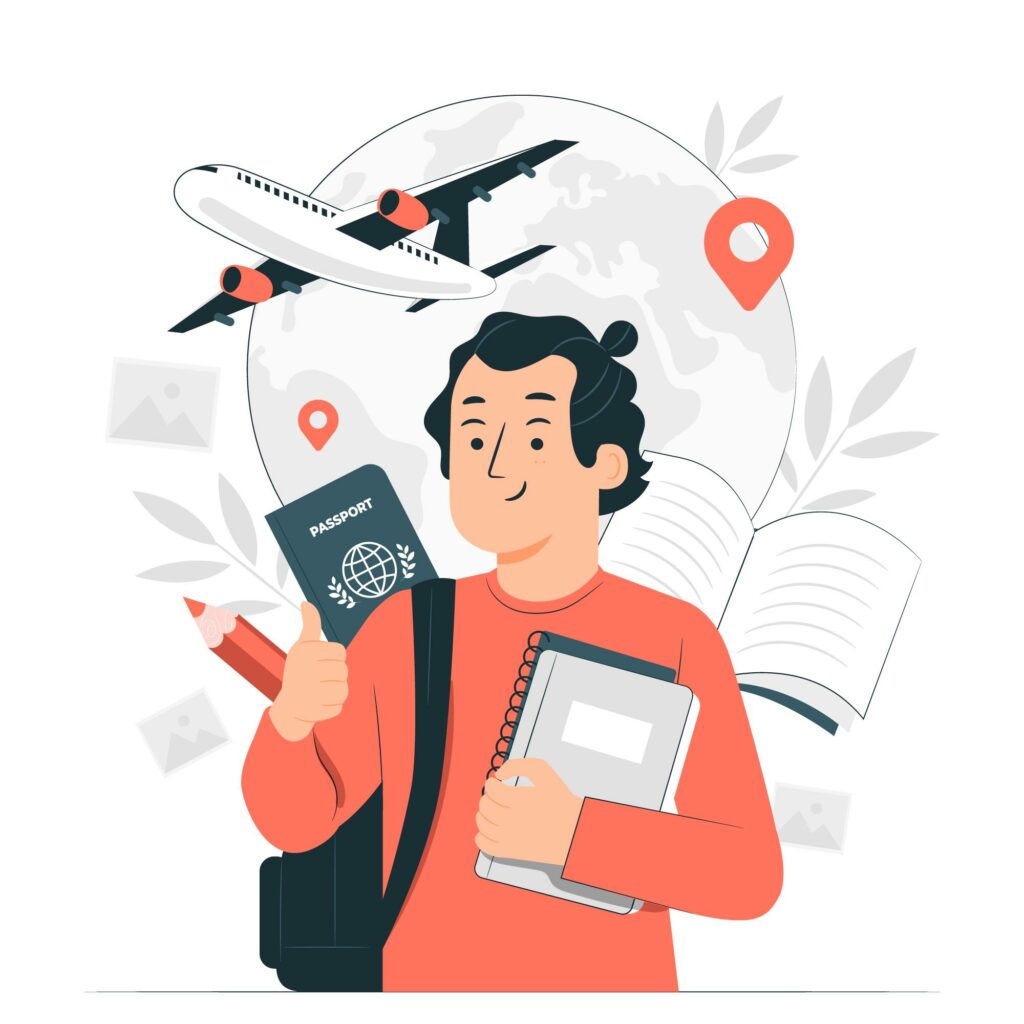
Personal Growth
Educational tourism provides numerous opportunities for personal growth. Travellers are exposed to new environments and experiences that can foster self-discovery, adaptability, and resilience. They can develop interpersonal skills through interactions with diverse groups of people, enabling them to communicate effectively in different cultural contexts. Furthermore, participating in educational trips can also enhance critical thinking and problem-solving abilities as individuals learn to navigate unfamiliar situations.
Professional Growth
Pursuing educational tourism can significantly contribute to professional growth. Acquiring new skills and knowledge, particularly in a global context, can make individuals more competitive in the job market, set them apart from their peers, and increase their chances of employment. Additionally, some educational tourism programs provide opportunities for networking, collaboration, and exposure to industry professionals, which can result in valuable connections and insights that can propel one’s career forward.
Cultural Knowledge
Engaging in educational tourism immerses individuals in the destination country’s local culture, history, and traditions. This exposure to diverse cultures enriches travellers’ understanding of the world and broadens their perspectives. By participating in culturally immersive activities, like workshops, visiting museums or engaging with local communities, individuals can gain a deeper appreciation for and understanding of various cultural practices. This increased cultural knowledge promotes tolerance, respect, and empathy towards other cultures.
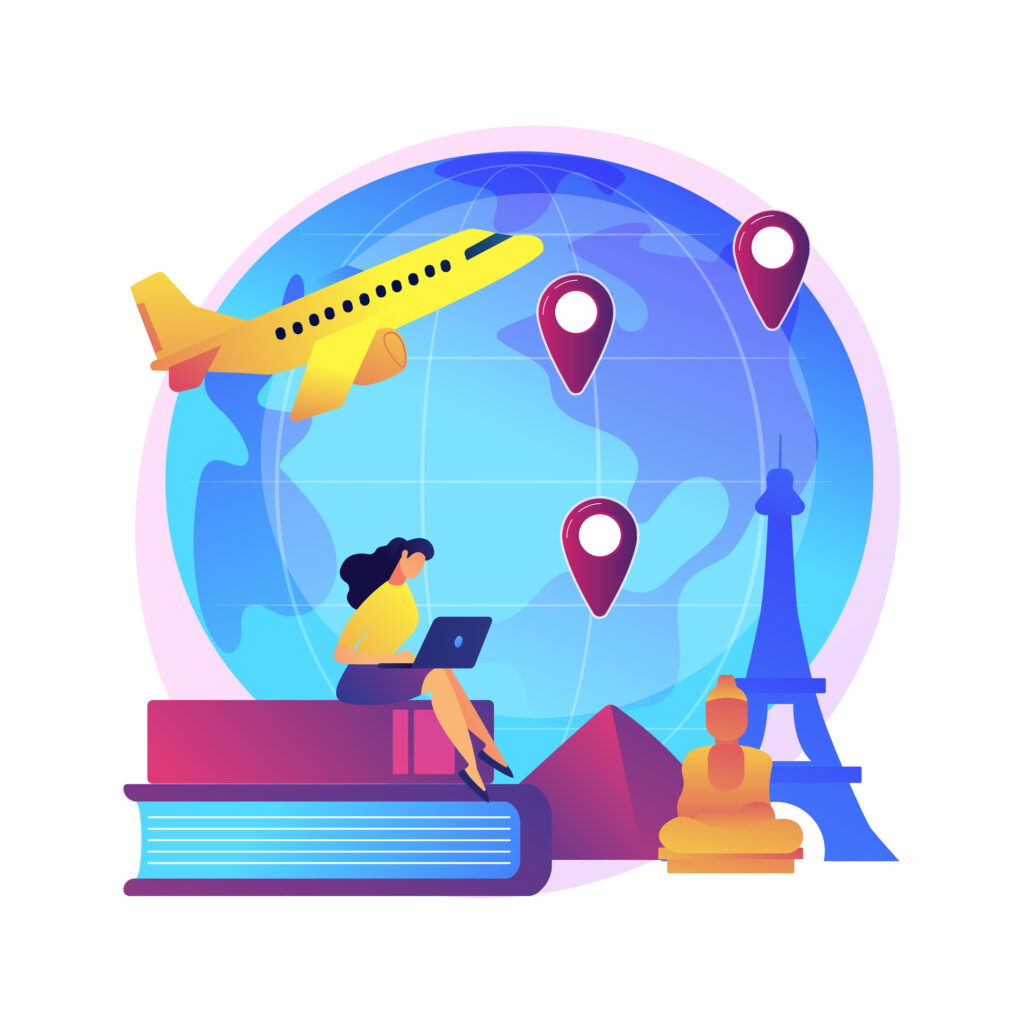
In Europe, France is a top destination for educational tourism, offering cultural experiences like art galleries and museums and language immersion programs. Italy is another popular choice, known for its history, architecture, and cuisine. Students can visit famous landmarks like the Colosseum or the Leaning Tower of Pisa while learning about the country’s rich heritage. Germany is an ideal destination for learning about its technological advancements and history, with attractions like the Berlin Wall and BMW Museum. Finally, the United Kingdom offers various educational activities, including famous landmarks such as Buckingham Palace and the British Museum.
Japan is a sought-after educational tourism destination in Asia, known for its technological innovations and deep-rooted traditions. Visitors can participate in tea ceremonies, learn about samurai culture, and explore high-tech cities like Tokyo. Thailand provides opportunities for learning about Southeast Asian history, visiting temples and ancient sites, and exploring its rich biodiversity. India is another popular choice, featuring architectural wonders like the Taj Mahal, rich cultural heritage, and diverse traditions.
North America
In the United States , educational tourism spans from historical landmarks, like the Washington Monument and Ellis Island, to scientific institutions, such as NASA’s Kennedy Space Center. The US offers numerous educational activities, including visiting national parks and learning about the country’s diverse demographics.
Australia is recognized for its unique flora and fauna, making it an ideal destination for biology and ecology students. The Great Barrier Reef, the Outback, and various wildlife sanctuaries can be visited for learning opportunities in Australia.
Please note that this list is not exhaustive, and plenty of more destinations are available for educational tourism across the globe.
The Canadian Tourism Commission (2001) notes two main components to the supply side of educational tourism: the primary tourist product and secondary or support elements.
A variety of organisations combine to form the primary educational tourism experience, including:
- Attractions and events which provide the venue for learning experiences (e.g. parks, historic sites, zoos, bird and wildlife sanctuaries and archaeological dig sites).
- Resource specialists who are responsible for delivering the learning component of these vacations (e.g. employees, curators, interpreters, lecturers, storytellers, researchers and academics).
- Affinity travel planners from organisations who help plan and develop learning programmes for travellers (e.g. special interest groups, conservation organisations, universities and language schools).
- Tour and receptive operators who package experiences for customers and organisations and provide destination expertise, local knowledge, escort services and marketing services.
However, secondary suppliers or support services are also required for educational travellers, including:
- Transportation such as cruise, bus and train transport as part of an independent trip or package, including travel to and from the departure point.
- Hospitality services , including catering, recreation, entertainment, social activities and accommodation options.
- Travel services , including travel agents, insurance companies, travel media and advertising.
- Destination marketing organisations who operate at a national, regional or local level to promote educational travel and tourism to potential tourists.
It is the combination of primary and secondary suppliers which will create the educational tourist experience consumed by travellers. The continued development of innovative partnerships and product development is critical to the future of the educational tourism industry.
Student Exchange Programs
Student exchange programs are a popular form of educational tourism, allowing students to experience other cultures and improve their language skills. These programs often involve partnerships between universities and schools in different countries. Global Volunteers and GVI Company are examples of organizations that facilitate student exchanges. Participants may stay with host families or in university dormitories, promoting cross-cultural understanding and lifelong connections.
Language Schools
Language schools are another popular option for educational tourism, providing immersive learning experiences. Students can attend classes to improve their language skills while enjoying exploring a new country. EF Tours and ACIS Educational Tours are notable companies that organize language school trips, catering to various age groups and proficiency levels. These tours can include cultural activities, excursions, and opportunities to practice conversation with native speakers.
Workshops and Seminars
Workshops and seminars provide focused learning experiences on specific subjects, usually conducted quickly. Travellers can attend workshops and seminars on topics such as art, cooking, photography, or writing, hosted by experts in the field. These educational tourism experiences often include accommodations, meals, and excursions related to the explored topic. Companies like Workshop Travels specialize in organizing these types of trips, offering unique educational opportunities alongside cultural experiences.
Educational Tours Companies
Educational tour companies often offer tailor-made itineraries for school trips and excursions, providing students with hands-on experiences in various subjects. Examples include exploring historical landmarks, visiting museums, and participating in local customs and traditions. EF Tours, ACIS Educational Tours, and School Excursions are well-known companies that arrange these trips for schools and universities. Packages range from short one-day outings to multi-week adventures catering to diverse educational needs and interests.
In summary, educational tourism programs and companies cater to various learning experiences and fields of interest, offering unique travel opportunities for students, educators, and travellers.
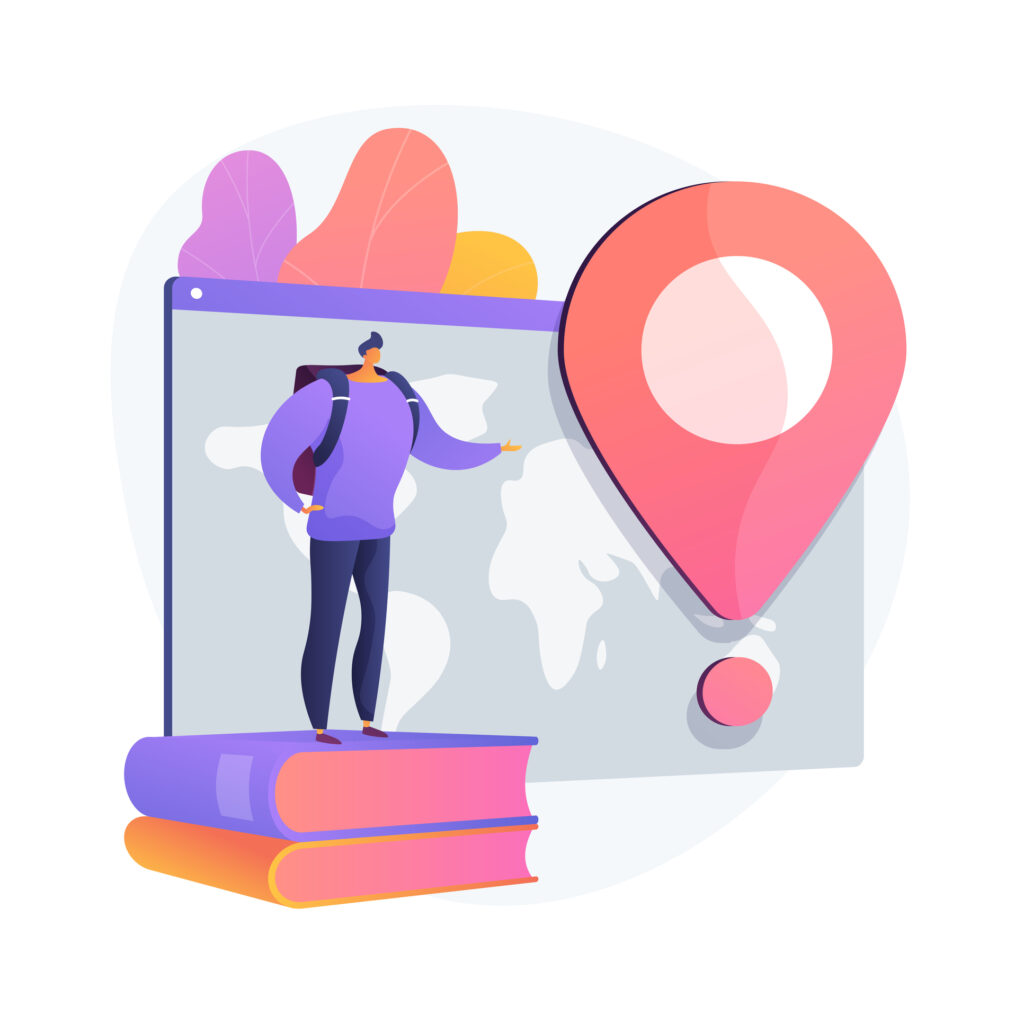
Broadening Cultural Experience
Educational tourism immerses travellers in diverse cultures, art, history, and architecture. This exposure leads to a deeper understanding and appreciation for different ways of life. Tourists broaden their perspectives by visiting historical landmarks, engaging with local communities, and participating in cultural activities. Exploring unique landscapes and learning foreign languages also contribute to culturally enriching experiences.
Enhancing Education and Teaching
Through educational tourism, individuals can enhance their knowledge and skills by learning from experts in various fields. Incorporating hands-on experiences in subjects like history, art, and architecture provides a more engaging and memorable educational journey. As a result, such incidents often stimulate a lifelong passion for learning and a greater appreciation for diverse subjects. Furthermore, educators can bring back valuable insights, tools, and teaching methods to enrich their classrooms and contribute to improved teaching practices.
Boost to Employment and Business
Educational tourism creates a demand for skilled professionals in the tourism industry . This demand increases employment opportunities for local guides, translators, and educators. Moreover, the influx of travellers contributes to the growth of local businesses such as hotels , restaurants, and entertainment venues. Education tourism strengthens the foundation for sustainable growth within the global community by fostering cultural exchange and economic development.
Impact on Local Cultures
Educational tourism offers the opportunity to learn about new cultures and societies but can also significantly impact these communities. Over-tourism can lead to commodifying cultural experiences, with locals feeling pressured to adjust their traditions and customs for tourist consumption. This can result in losing crucial cultural heritage, a decline in authenticity, and socio-cultural tensions between visitors and local populations.
Furthermore, tourists’ motivation to learn about new cultures may sometimes result in intrusive behaviour. The desire to explore and understand can lead to an invasion of privacy or violations of personal boundaries, creating resentment within the local community.
Environmental and Social Issues
Another challenge of educational tourism is the ecological footprint it leaves behind. As tourists travel to remote destinations, they often generate environmental issues such as pollution, littering, and depletion of natural resources. These actions can endanger the ecosystems on which local communities rely for their livelihoods.
Additionally, educational tourism can exacerbate social inequality. Wealthier tourists can consume resources, push up the cost of living, and drive up housing prices in popular destinations, making it increasingly difficult for locals to afford necessities.
To minimize the negative impacts, tourists and educational institutions must be conscious of their actions and strive for sustainable and responsible tourism practices.
Global Trends and Growth
Educational tourism is gaining rapid prominence in the global tourism industry, driven by the increased number of international students, researchers, and individuals exploring new places for learning. The year-on-year growth of educational tourism has been remarkable, indicating its significance and potential for the future of educational tourism . The compound annual growth rate (CAGR) of educational tourists globally is expected upward.
With more diverse modes of transportation available, travelling for educational purposes is becoming more accessible to individuals worldwide. As a result, global educational tourists are anticipated to grow exponentially over the coming years. Dark tourism has also garnered attention as an educational sub-sector among the various niche segments. It involves visiting sites associated with death, tragedy, or adverse historical events, encouraging tourists to learn about critical aspects of human history.
International Collaborations
In the age of globalization, international collaborations have become the cornerstone for promoting educational tourism. Universities and academic institutions worldwide have recognized the benefits of global exposure through partnership programs, research initiatives, and exchange opportunities for students and faculty. These collaborations foster cultural exchange, promoting understanding different perspectives and contributing to academic advancements.
International students, in particular, play a pivotal role in boosting educational tourism’s global reach. With increasing interest in studying abroad, greater acceptance of different cultures, and the opportunities offered through international collaborations, international student mobility is expected to rise. Consequently, educational tourism will continue to thrive and evolve, enriching people’s lives with the experiential knowledge they acquire through travel and tourism .

Educational tourism, also known as “edutourism” or “academic tourism,” involves travel experiences designed to provide participants with opportunities for learning, cultural enrichment, and personal growth. Here are some examples of educational tourism:
- Museum Tours: Travelers visit museums, art galleries, science centres, and historical sites to learn about art, history, science, and culture. Guided tours , interactive exhibits, and informative displays help visitors gain insights into various subjects.
- Cultural Exchange Programs: These programs facilitate interactions between travellers and local communities. Participants engage in homestays, language immersion, and cultural workshops to understand different cultures and traditions firsthand.
- Historical Site Visits: Travelers explore historical landmarks, ancient ruins, and heritage sites to learn about past civilizations, events, and architecture. These visits provide insights into the historical context of a region.
- Language Learning Trips: Participants travel to destinations where the target language is spoken. Language immersion programs offer classes, cultural activities, and opportunities to practice language skills in real-life settings.
- Culinary Tours: Travelers explore the local cuisine, visit markets, and participate in cooking classes to learn about food traditions, ingredients, and cooking techniques of a particular region.
- Eco-Tourism and Sustainability Tours: These tours focus on ecological conservation, sustainable practices, and environmental awareness. Participants learn about local ecosystems, wildlife, and efforts to protect the environment.
- Educational Workshops and Retreats: Travelers attend workshops, seminars, and retreats related to personal development, wellness, and skill enhancement. These events provide opportunities for learning new skills and self-improvement.
- Educational Cruises: Cruises often offer onboard lectures, workshops, and field excursions that provide travellers with educational experiences while visiting multiple destinations.
- Academic Conferences and Seminars: Professionals, researchers, and students attend conferences and seminars to present and discuss research findings, share insights, and engage in academic discussions.
- Volunteer Tourism (Voluntourism): Travelers engage in volunteer activities, such as teaching, community development, or conservation efforts, while experiencing the local culture and gaining insights into societal challenges.
- Wildlife and Nature Tours: Participants explore natural habitats, observe wildlife, and learn about biodiversity, conservation, and ecological systems through guided tours and excursions.
- Adventure-Based Learning: Adventure activities such as outdoor expeditions, trekking, and team-building exercises provide opportunities for personal growth, leadership development, and experiential learning.
- Educational Farm Stays: Travelers stay on farms to learn about agriculture, animal husbandry, and sustainable farming practices. They may participate in farm activities and gain an appreciation for rural life.
- University or School Exchange Programs: Students participate in exchange programs to study abroad, gaining exposure to different educational systems, cultures, and perspectives.
- Archaeological Expeditions: Participants join archaeological digs to learn about ancient civilizations and the process of excavation and preservation.
Educational tourism offers participants a chance to learn beyond traditional classroom settings, fostering cultural understanding, personal development, and a broader worldview. The activities and experiences can vary widely, allowing travellers to choose options that align with their interests and learning goals.

IMAGES
COMMENTS
Educational tours are professionally planned tours that have been finely crafted based on the needs of the entire group. Essentially, an educational tour is an enhanced and upgraded version of the traditional field trip.
Educational Travel is a carefully planned combination of tours, site visits and hands-on learning opportunities, built around clear learning objectives. An educational tour is more than a vacation. It’s a tool for learning and success with fun and excitement built in.
EF Educational Tours offers student tours at the lowest prices guaranteed. Learn why teachers and parents choose EF for educational travel.
Not-for-profit creator of experiential travel opportunities all over the world for age 50+ Group or solo packages include lodging, meals, & expert-guided educational tours. Educational Adventures. 2023 & 2024 Enrolling Now.
What is Educational Travel? Adventurous, exploratory, informational and fun are some of the ways we describe our educational tours. Done right, educational tours expand travelers’ world view. Not only do students learn, they learn to love to learn. Through cultural exploration and immersion, students become global citizens.
Educational tourism has evolved in response to rising demand and greater availability of diverse travel experiences in recent years. From attending language schools to participating in workshops or seminars, there are endless ways to learn and grow while exploring new destinations.